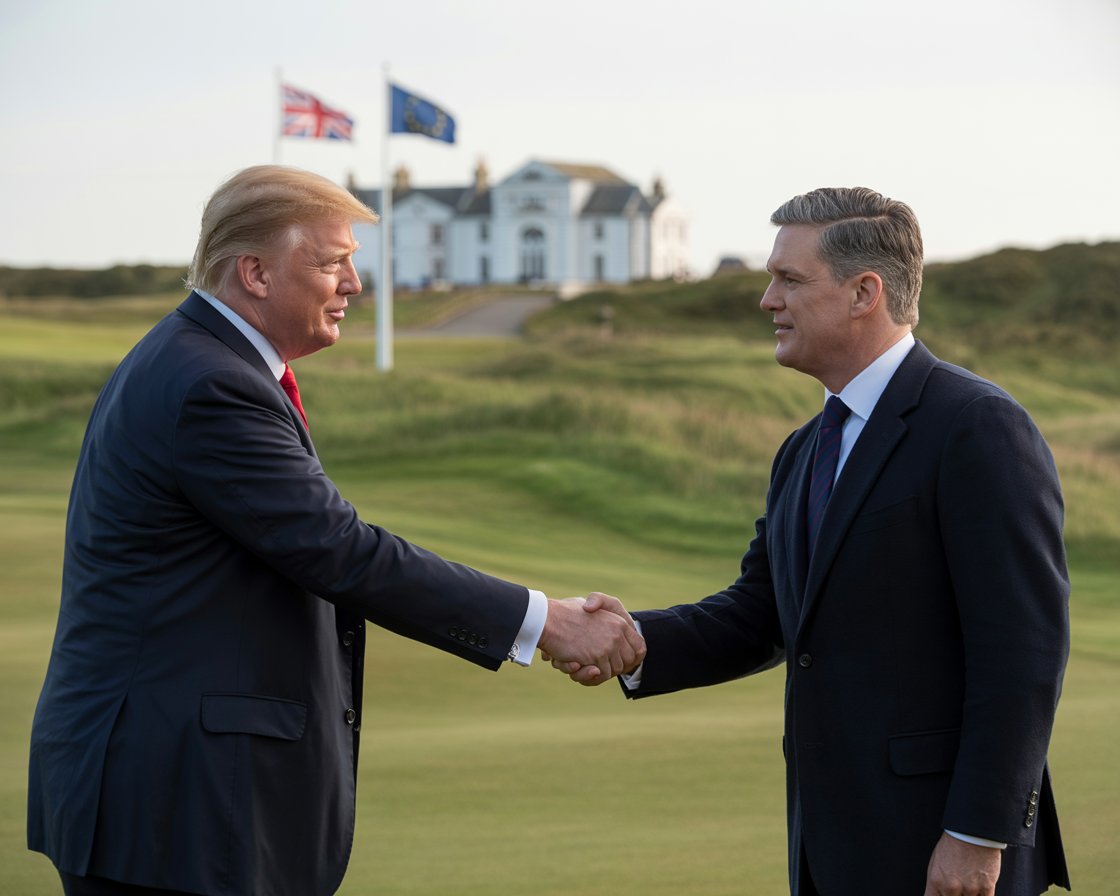President Trump strikes a 15% EU trade deal, meets UK PM Keir Starmer, addresses Gaza crisis, and shortens Putin’s ceasefire deadline — all within 72 hours.
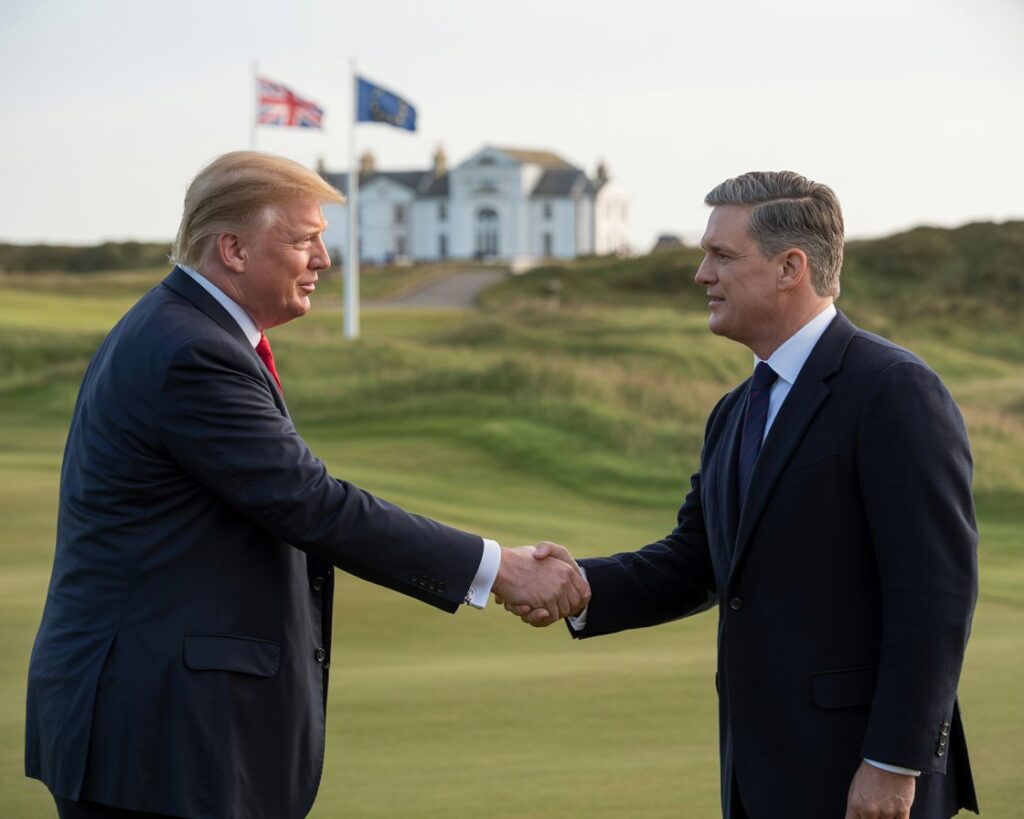
Trump’s Strategic Diplomacy: EU Trade Deal, UK Meeting, and Global Impacts
President Donald Trump’s recent international maneuvers have drawn global attention, marking a pivotal moment in U.S. foreign policy and trade. Over a span of a few intense days, Trump finalized a trade deal with the European Union, met with UK Prime Minister Keir Starmer in Scotland, and addressed critical geopolitical issues including the humanitarian crisis in Gaza and the ongoing war in Ukraine. The whirlwind of high-stakes diplomacy is reshaping America’s role on the global stage.
The EU Trade Deal: A Delicate Balance of Power
Trump’s declaration of a trade agreement with the European Union came as a relief to markets and political observers who feared a looming transatlantic trade war. The deal, although thin on specifics, sets a 15% tariff on most EU imports to the U.S. — higher than the 10% implemented earlier in April, but a significant pullback from Trump’s previous threats of 50% tariffs.
Key Provisions:
- 15% tariff on most European goods.
- Elimination of tariffs on select industries: aircraft parts, semiconductors, generic pharmaceuticals, chemicals, and certain agricultural goods.
- The EU will invest $600 billion more in the U.S. economy.
- A $750 billion commitment from the EU to buy U.S. energy products.
While Trump hailed the agreement as “the biggest deal ever made,” European leaders offered mixed reactions. French Prime Minister François Bayrou labeled it a “dark day” for Europe, while Belgian and German officials cautiously welcomed the agreement as a necessary compromise.
Economic analysts have pointed out that while the deal avoids an all-out trade war, the higher baseline tariffs may still drive up prices for American consumers and complicate transatlantic supply chains.
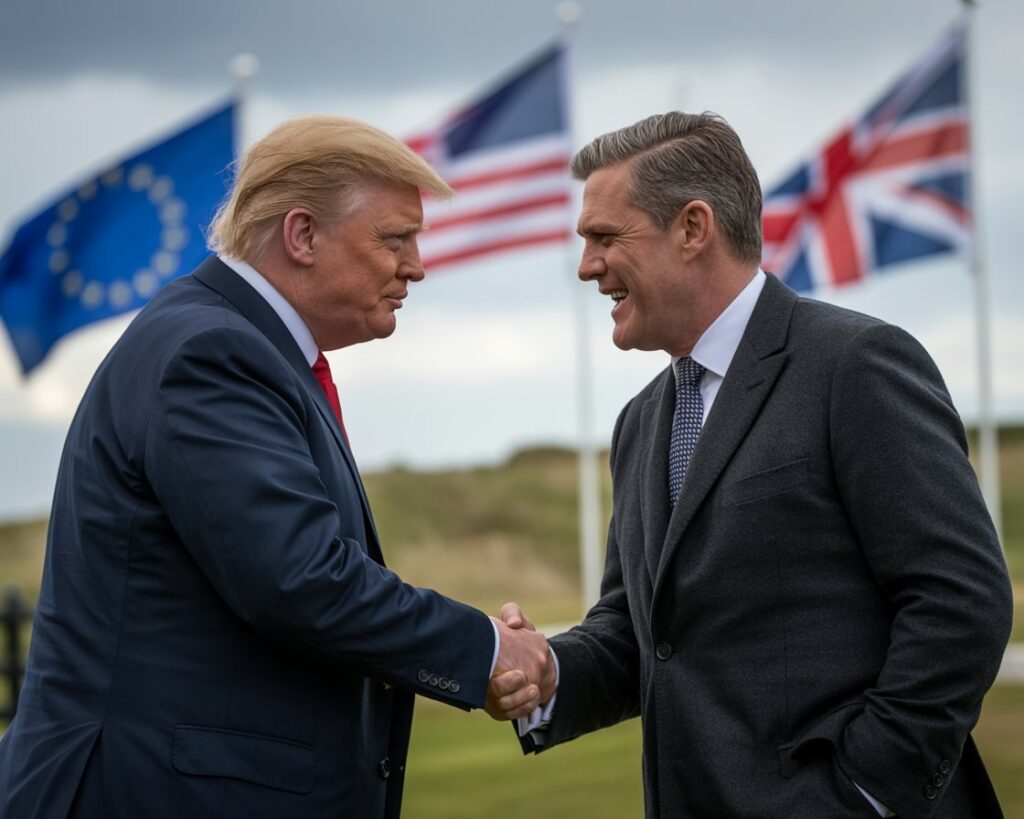
Trump Meets UK Prime Minister Keir Starmer: Diplomacy on the Green
Following the EU deal, Trump met with UK Prime Minister Keir Starmer at his golf course in Turnberry, Scotland. While critics have raised eyebrows at Trump’s blending of official duties with personal business interests, the meeting tackled substantial issues.
Discussion Points:
- Strengthening U.S.-UK trade ties.
- The humanitarian crisis in Gaza.
- Russia’s invasion of Ukraine.
The informal summit set the stage for a more formal state visit in September, upon the invitation of King Charles III. Both leaders expressed mutual respect, with Starmer acknowledging Trump’s efforts in pursuing a ceasefire in Gaza, while Trump emphasized the importance of feeding starving civilians over taking political stances.
“Right now, to me, that’s the number one position, because you have a lot of starving people,” Trump said.
Starmer, representing a newly empowered Labour government, struck a more assertive tone, emphasizing Britain’s cooperation with Jordan to airdrop aid into Gaza and urging Israel to remove logistical barriers preventing humanitarian deliveries.
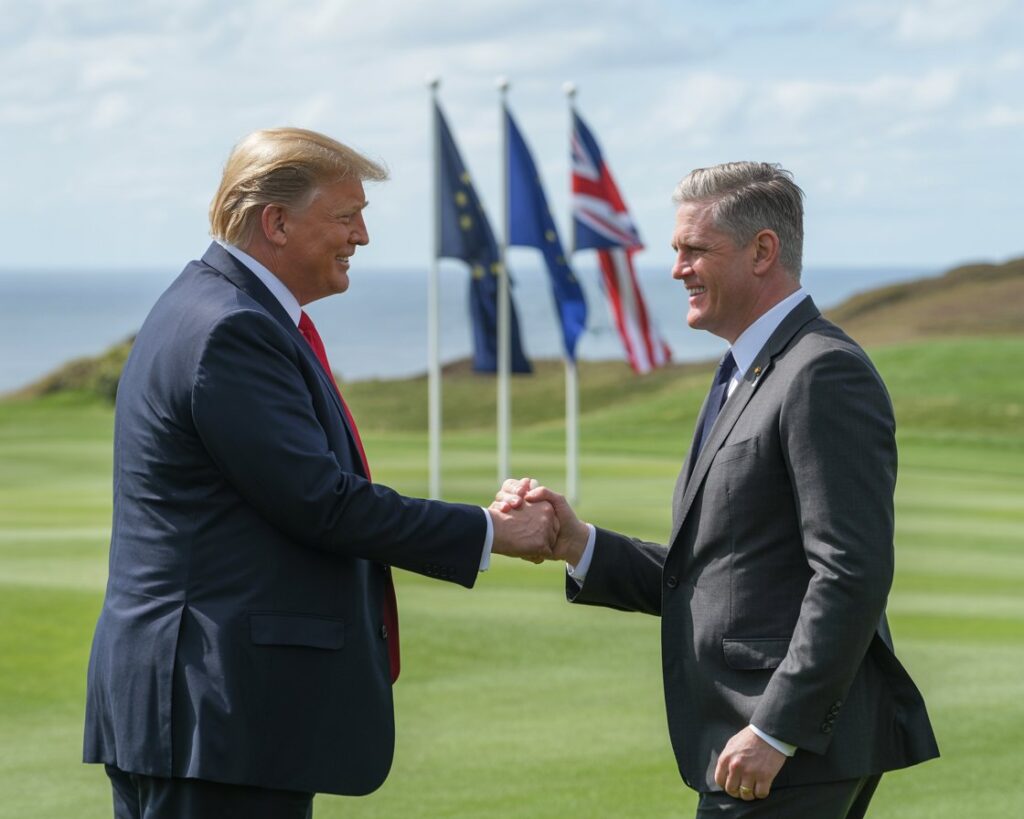
Gaza Crisis: A Flashpoint in Global Politics
The Gaza Strip remains a flashpoint of international concern. Images of starving children and collapsing infrastructure have galvanized international condemnation. At the Turnberry meeting, Starmer directly addressed the British public’s outrage:
“It’s a humanitarian crisis. It’s an absolute catastrophe,” Starmer stated. “People in Britain are revolted at what they’re seeing.”
While Trump stopped short of endorsing a two-state solution or recognizing Palestinian statehood — a move France is reportedly preparing for in September — he acknowledged the dire conditions and called for immediate food and medical assistance.
This pragmatic stance underscores Trump’s focus on short-term humanitarian relief rather than long-term political resolution.
Russia-Ukraine War: Shortening the Deadline
In another major revelation, Trump announced that he was reducing the 50-day deadline he had previously given Russian President Vladimir Putin to reach a ceasefire deal with Ukraine.
“I’m disappointed in President Putin, very disappointed in him,” Trump said. “I’m going to reduce that 50 days to a lesser number.”
Previously, Trump had warned of imposing “secondary tariffs” up to 100% on Russian goods if no ceasefire was reached. Trump’s latest remarks signal growing frustration with Putin’s intransigence, and may mark a strategic pivot to accelerate peace efforts or increase economic pressure.
Global Trade Shifts: US-China Talks Resume
While Trump’s attention was largely on Europe and the UK, another key development occurred in Sweden, where U.S.-China trade talks resumed. The Chinese delegation, emboldened by economic resilience and strategic leverage over rare earth minerals, met with U.S. Treasury Secretary Scott Bessent to extend a truce set to expire August 12.
Trump previously reversed some export bans on AI chips to China, signaling a complex dance between confrontation and concession. As Trump stated, “We’re very close to a deal with China,” though no further details were given.
Trump’s Blending of Business and Statecraft
Trump’s Scotland visit, which included time at his golf properties in Turnberry and Aberdeenshire, highlights the unusual fusion of presidential duties and personal business. Critics note Trump’s growing foreign investments and product lines, from crypto ventures and mobile services to luxury goods and branded Bibles.
His dual role raises questions about ethics and the extent to which personal profit intersects with public office. Yet, Trump’s supporters argue that his business acumen enhances his global negotiation skills.
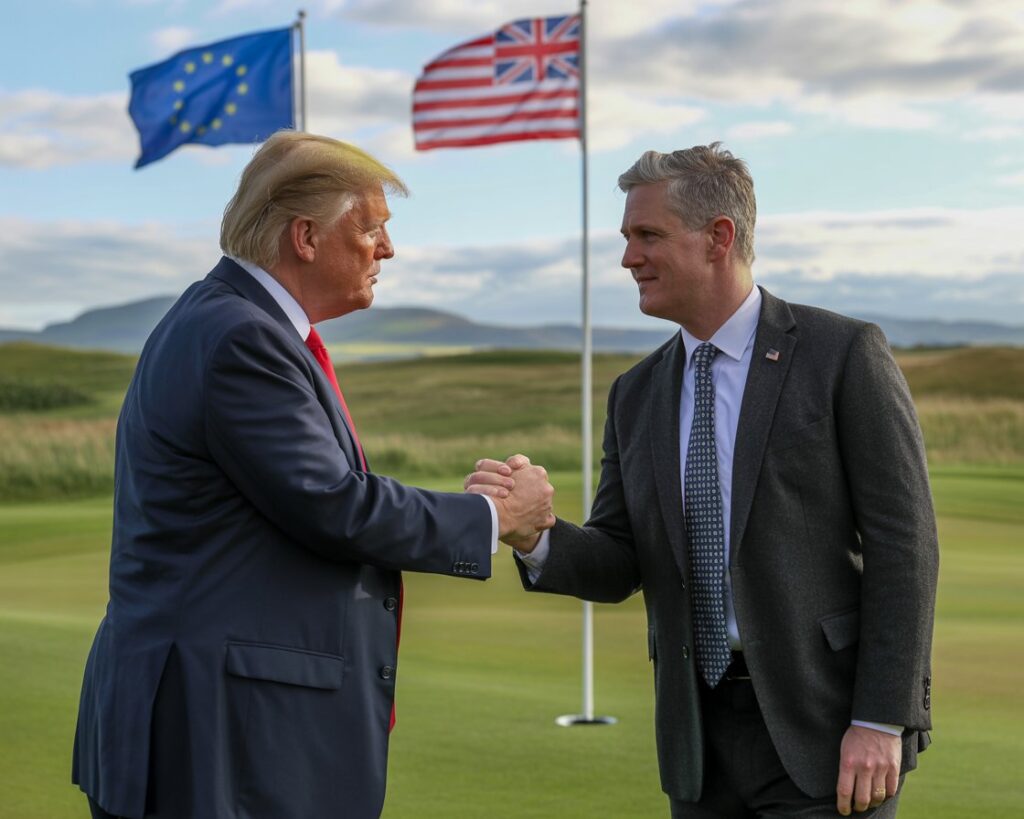
European Reactions: Divided and Skeptical
The EU-US trade agreement has divided European leaders. While some see it as a pragmatic solution, others view it as capitulation to American pressure.
- France: PM Bayrou called it “submission.”
- Belgium: PM Bart De Wever acknowledged it as a moment of “relief but not celebration.”
- Germany: Trade officials expressed concern over long-term economic implications.
European Parliament’s trade committee chair Bernd Lange labeled the deal as “lopsided” and lacking reciprocity.
Public Opinion: Relief, Concern, and Curiosity
Across the U.S. and Europe, public reactions are mixed. Markets responded with modest gains:
- Dow +0.3%
- Nasdaq +0.4%
- S&P 500 +0.3%
Industries benefiting from zero tariffs, such as aerospace and tech, welcomed the deal. However, American consumers and EU exporters now face price hikes on a wide array of goods.
Meanwhile, Trump’s stance on Gaza and Ukraine has garnered both praise and skepticism. His call for humanitarian aid over political declarations resonates with some, while others critique the lack of a broader peace strategy.
What Comes Next?
The global landscape is shifting rapidly. Trump’s multi-pronged diplomacy reflects a blend of assertive trade policies, strategic alliances, and pragmatic responses to geopolitical crises. As the world watches:
- Will the EU deal hold long-term?
- Can Trump broker a ceasefire in Ukraine?
- How will the Gaza situation evolve?
- What will China demand in the next trade round?
One thing is certain: Trump’s approach, controversial and unconventional, is leaving a profound mark on 21st-century geopolitics.
Conclusion:
President Trump’s whirlwind diplomacy in Europe — including the EU trade deal, the UK meeting, and his remarks on global crises — showcases a high-stakes, high-profile foreign policy strategy. While results are still unfolding, his assertive tactics and ability to mix politics with personal brand power continue to redefine how the U.S. interacts with the world.
